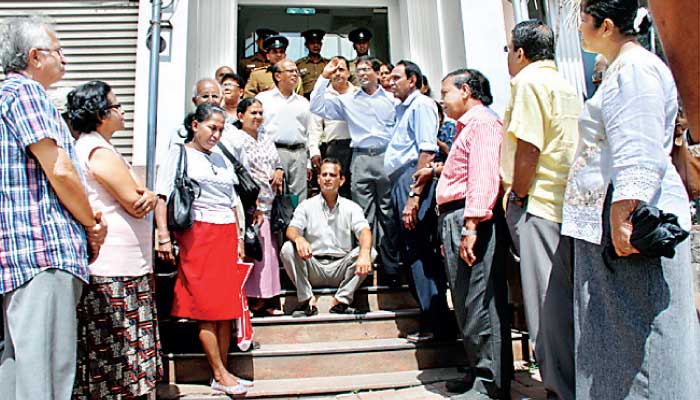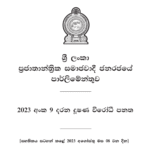Case: S.C. (FR) Nos. 263/2009 and 262/2009
Parties Involved:
- Petitioners: H.C.K. Kumarasinghe, D.E. Gunasekera, and 12 others.
- Respondents:
- Monetary Board of the Central Bank of Sri Lanka.
- His Excellency Mahinda Rajapaksa, President of Sri Lanka (then).
- Ajith Nivard Cabraal, Governor of the Central Bank.
- Directors and entities within the Ceylinco Group, including Deshamanya Dr. Lalith Kotelawala, key members of Ceylinco Shriram Capital Management Services (Pvt.) Ltd., and other finance-related subsidiaries.
Case Background:
The case arose out of the collapse of several finance companies under the Ceylinco Group, resulting in substantial financial losses for depositors. The Petitioners alleged fraudulent practices by company directors and managers, including mismanagement of funds, misleading depositors, and failing to uphold fiduciary duties.
The collapse created public outcry and led to numerous legal actions. The Supreme Court took proactive steps, appointing a Committee of Chartered Accountants to oversee asset recovery and prioritize repayments to affected depositors.
Key Developments:
- Petition by 12th Respondent-Petitioner:
- Ajith Rohan Gunawardena (12th Respondent) filed a petition on January 30, 2024, seeking:
- Permission to withdraw funds from accounts listed in a schedule annexed to his petition.
- Approval to trade shares and access his pension funds.
- The petition attempted to clarify that no court orders restricted him from performing these actions.
- Ajith Rohan Gunawardena (12th Respondent) filed a petition on January 30, 2024, seeking:
- Objections to the Petition:
- Monetary Board of Sri Lanka:
- The Board’s legal representatives argued that the petition sought to alter or undermine prior court orders.
- They cited the Committee of Chartered Accountants’ recommendation that directors’ assets should remain restricted until depositor repayments were completed.
- Original Petitioners:
- One of the original Petitioners, upon learning of the petition through a third party, strongly opposed it.
- They argued that granting relief to the 12th Respondent would harm depositors’ interests and disrupt ongoing asset recovery efforts.
- Monetary Board of Sri Lanka:
- Criminal Indictment Against 12th Respondent:
- The 12th Respondent faced criminal charges in the High Court of Kandy (Case No. H.C. 153/2011).
- The indictment, amended to include 3,806 counts, accused him of conspiracy, fraud, and misappropriation of depositor funds.
- Despite orders for expeditious proceedings, delays in the High Court case were partly attributed to requests from the 12th Respondent for postponements, citing the pendency of the fundamental rights petitions.
Legal and Procedural Analysis:
- Nature of Relief Sought:
- The reliefs sought by the 12th Respondent were considered atypical and contradictory to established principles.
- Specifically, the request for declarations that no existing orders barred him from accessing funds and trading shares was seen as an attempt to preemptively shield himself from potential consequences.
- Impact on Depositors:
- Granting the petition could have compromised depositor interests by allowing the 12th Respondent access to potentially recoverable assets.
- The Supreme Court prioritized safeguarding depositor rights over the personal interests of directors accused of fraudulent activities.
- Compliance with Procedural Requirements:
- The petition was filed without notifying original Petitioners or other respondents, undermining principles of fairness and transparency.
- The court underscored the importance of involving all stakeholders in such applications to ensure just outcomes.
Court Decision:
- Dismissal of the Petition:
- The Supreme Court found no merit in the petition and dismissed it outright.
- The court reaffirmed that earlier orders ensuring depositor repayments and asset restrictions remained binding and could not be circumvented.
- Broader Implications:
- The decision sent a strong message regarding accountability and judicial oversight in cases of financial fraud.
- It highlighted the court’s commitment to protecting the public from systemic failures in financial institutions.
Impact on Stakeholders:
- For Depositors:
- The ruling reinforced their position as primary beneficiaries of asset recovery efforts.
- It ensured that directors’ personal assets remained subject to court directives until depositor claims were fully addressed.
- For Directors and Managers:
- The decision emphasized the accountability of company executives for their actions, particularly in cases involving public trust.
- It underscored the judiciary’s role in preventing misuse of legal processes to evade responsibility.
- For Financial Institutions:
- The case highlighted the need for robust regulatory mechanisms to prevent similar collapses.
- It called attention to the importance of transparency and ethical governance in maintaining public confidence.
Policy Recommendations:
- Strengthen Regulatory Oversight:
- Enhance the Central Bank’s supervisory capacity to identify and address financial irregularities early.
- Implement stricter licensing and monitoring requirements for finance companies.
- Reinforce Legal Frameworks:
- Amend laws to expedite legal proceedings in cases involving financial fraud and public funds.
- Introduce measures to protect whistleblowers and encourage reporting of malpractices.
- Improve Public Awareness:
- Conduct awareness campaigns to educate the public about financial risks and due diligence when investing.
- Establish accessible channels for reporting grievances and seeking redress.
- Promote Ethical Corporate Practices:
- Encourage companies to adopt robust internal controls and governance frameworks.
- Mandate regular audits and transparent disclosure of financial information.
Conclusion:
The Supreme Court’s dismissal of the petition by the 12th Respondent-Petitioner reaffirms the judiciary’s role in ensuring justice and protecting public interests. The case underscores the need for systemic reforms to prevent financial fraud and enhance trust in the financial system.
Reas Full Judgement














